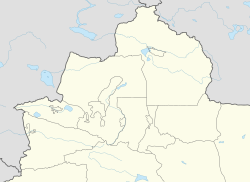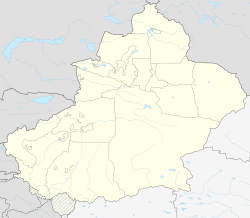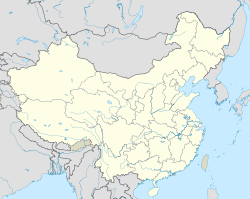Dabancheng, Ürümqi
Dabancheng
达坂城区 • داۋانچىڭ رايونى Dawanching | |
|---|---|
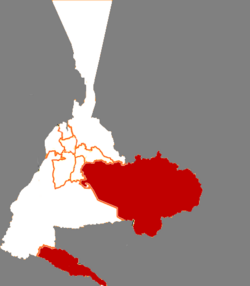 Dabancheng in Ürümqi | |
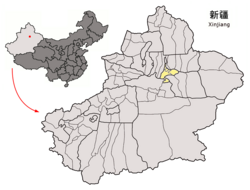 Ürümqi in Xinjiang | |
| Coordinates: 43°48′N 87°35′E / 43.800°N 87.583°E | |
| Country | China |
| Province | Xinjiang |
| Prefecture-level city | Ürümqi |
| District seat | Dabancheng Town |
| Area | |
• Total | 4,764 km2 (1,839 sq mi) |
| Population (2020)[1] | |
• Total | 35,540 |
| • Density | 7.5/km2 (19/sq mi) |
| Time zone | UTC+8 (China Standard[a]) |
| Website | www |
| Dabancheng, Ürümqi | |||||||
|---|---|---|---|---|---|---|---|
| Chinese name | |||||||
| Simplified Chinese | 达坂城区 | ||||||
| Traditional Chinese | 達坂城區 | ||||||
| |||||||
| Uyghur name | |||||||
| Uyghur | داۋانچىڭ رايونى | ||||||
| |||||||
Dabancheng District (Chinese: 达坂城区; pinyin: Dábǎnchéng Qū) or Dawan Cheng (Uyghur: داۋانچىڭ رايونى, romanized: Dawanching Rayoni, Даванчиң Райони), is one of 7 urban districts of the prefecture-level city of Ürümqi, the capital of Xinjiang Uygur Autonomous Region, Northwest China. Located southeast of the Ürümqi urban area, it contains an area of 5,042 km2 (1,947 sq mi). According to the 2002 census, it has a population of 40,000.
The district seat of government is the town of the same name (Dabancheng Town). The name means 'Pass City'. Just south of the town is a low pass on the road from Ürümqi southeast to Turfan. It crosses a mountain spur that connects the main Tien Shan with the Bogda Shan to the northeast. As of July 2015 GoogleEarth appears to show road and rail tunnels and viaducts being built to avoid the pass.
Human habitation and irrigated agriculture in this arid area are made possible primarily by streams flowing south from the Bogda Shan range, which is located on the northern border of the district. The water that is not used up for irrigation locally flows into the district's several small lakes (Yanhu, Xiao Yanhu and Chaiwopu Lake) or down the Baichang River into the Toksun County.
“It showed me the utter barrenness of the slopes of gravel and decayed rock over which the ascent is made from the Turfān depression to the watershed; the remarkably low elevation of the latter, which on the plateau of Ta-fan-ch’êng [= Dawan Cheng] scarcely rises above 3,000 feet; and the ease of communication secured by this route between the Turfān basin and Dzungaria. At the Chinese village of Ta-fan-ch’êng close to the watershed irrigation is still required for the fields, and a lively stream coming from the high Bogdo-ula mountains to the north-east serves this purpose. But on the low hills over which Urumchi is approached cultivation depends on rain and snowfall only. This marked change in climatic conditions made its effects strikingly felt when we reached Ta-fan-ch’êng from the south-east; for there can be no doubt that the violent gales from the north-east for which the plateau is notorious, and one of which obliged us to make a day's halt there under rather trying conditions, are directly due to the ‘ aspiration ’ which draws the cold air of Dzungaria through this great gap of the T’ien-shan down into the deep depression of Turfān, where the atmosphere is warmed, even during the short winter, by far more abundant sunshine.”[2]
Mountain ranges between Dabancheng and Ürümqi create a natural wind tunnel, increasing windspeed in the valley. Four of the five wind farms erected in Xinjiang in 2010 are in the area between National Highway 312 and the G30 Lianhuo Expressway, totaling more than 300 turbines.[3][4]
Administrative divisions
[edit]Dabancheng District contains 3 subdistricts, 1 town, and 3 townships:
| Name | Simplified Chinese | Hanyu Pinyin | Uyghur (UEY) | Uyghur Latin (ULY) | Administrative division code | |
|---|---|---|---|---|---|---|
| Subdistricts | ||||||
| Ewirghol Subdistrict | 艾维尔沟街道 | Àiwéi'ěr Jiēdào | ئېۋىرغول كوچا باشقارمىسى | Ëwirghol kocha bashqarmisi | 650107001 | |
| Ulanbay Subdistrict | 乌拉泊街道 | Wūlāpō Jiēdào | ئۇلانباي كوچا باشقارمىسى | Ulanbay kocha bashqarmisi | 650107004 | |
| Tuzköl Subdistrict (Yanhu Subdistrict) |
盐湖街道 | Yánhú Jiēdào | تۇزكۆل كوچا باشقارمىسى | Tuzköl kocha bashqarmisi | 650107006 | |
| Town | ||||||
| Dabancheng Town | 达坂城镇 | Dábǎnchéng Zhèn | داۋانچىڭ بازىرى | Dawanching baziri | 650107100 | |
| Townships | ||||||
| Donggou Township | 东沟乡 | Dōnggōu Xiāng | دوڭگۇ يېزىسى | Donggu yëzisi | 650107200 | |
| Xigou Township | 西沟乡 | Xīgōu Xiāng | شىگۇ يېزىسى | Shigu yëzisi | 650107201 | |
| Aksu Township | 阿克苏乡 | Ākèsū Xiāng | ئاقسۇ يېزىسى | Aqsu yëzisi | 650107202 | |
Climate
[edit]| Climate data for Dabancheng District, elevation 1,104 m (3,622 ft), (1991–2020 normals, extremes 1981–2010) | |||||||||||||
|---|---|---|---|---|---|---|---|---|---|---|---|---|---|
| Month | Jan | Feb | Mar | Apr | May | Jun | Jul | Aug | Sep | Oct | Nov | Dec | Year |
| Record high °C (°F) | 7.1 (44.8) |
10.3 (50.5) |
23.0 (73.4) |
32.3 (90.1) |
34.2 (93.6) |
36.9 (98.4) |
36.8 (98.2) |
37.1 (98.8) |
35.1 (95.2) |
28.9 (84.0) |
17.5 (63.5) |
9.3 (48.7) |
37.1 (98.8) |
| Mean daily maximum °C (°F) | −4.9 (23.2) |
0.7 (33.3) |
8.8 (47.8) |
17.7 (63.9) |
23.1 (73.6) |
27.0 (80.6) |
28.7 (83.7) |
28.1 (82.6) |
22.9 (73.2) |
14.8 (58.6) |
4.8 (40.6) |
−3.2 (26.2) |
14.0 (57.3) |
| Daily mean °C (°F) | −10.1 (13.8) |
−6.2 (20.8) |
0.9 (33.6) |
9.8 (49.6) |
15.5 (59.9) |
20.1 (68.2) |
21.6 (70.9) |
20.2 (68.4) |
14.6 (58.3) |
7.0 (44.6) |
−0.9 (30.4) |
−7.8 (18.0) |
7.1 (44.7) |
| Mean daily minimum °C (°F) | −14.5 (5.9) |
−11.7 (10.9) |
−5.3 (22.5) |
2.8 (37.0) |
8.2 (46.8) |
13.0 (55.4) |
14.8 (58.6) |
13.1 (55.6) |
7.4 (45.3) |
0.6 (33.1) |
−5.6 (21.9) |
−11.8 (10.8) |
0.9 (33.7) |
| Record low °C (°F) | −28.4 (−19.1) |
−25.6 (−14.1) |
−22.8 (−9.0) |
−11.4 (11.5) |
−7.8 (18.0) |
2.7 (36.9) |
5.4 (41.7) |
3.9 (39.0) |
−4.7 (23.5) |
−13.5 (7.7) |
−26.5 (−15.7) |
−30.9 (−23.6) |
−30.9 (−23.6) |
| Average precipitation mm (inches) | 1.5 (0.06) |
1.0 (0.04) |
1.7 (0.07) |
1.6 (0.06) |
3.5 (0.14) |
17.2 (0.68) |
26.5 (1.04) |
18.0 (0.71) |
6.4 (0.25) |
1.5 (0.06) |
1.2 (0.05) |
2.0 (0.08) |
82.1 (3.24) |
| Average precipitation days (≥ 0.1 mm) | 2.7 | 1.8 | 0.6 | 1.0 | 1.9 | 4.8 | 6.8 | 4.7 | 2.2 | 0.6 | 1.2 | 3.0 | 31.3 |
| Average snowy days | 7.9 | 4.8 | 2.4 | 0.8 | 0.2 | 0 | 0 | 0 | 0 | 0.6 | 3.3 | 8.0 | 28 |
| Average relative humidity (%) | 64 | 58 | 51 | 42 | 41 | 46 | 50 | 49 | 49 | 52 | 59 | 63 | 52 |
| Mean monthly sunshine hours | 191.5 | 205.0 | 255.8 | 286.6 | 325.7 | 313.3 | 304.9 | 298.7 | 278.5 | 253.0 | 193.6 | 168.0 | 3,074.6 |
| Percent possible sunshine | 65 | 68 | 68 | 70 | 71 | 68 | 66 | 71 | 76 | 76 | 68 | 61 | 69 |
| Source: China Meteorological Administration[5][6] | |||||||||||||
Notes
[edit]- ^ Locals in Xinjiang frequently observe UTC+6 (Xinjiang Time), 2 hours behind Beijing.
References
[edit]- ^ Xinjiang: Prefectures, Cities, Districts and Counties
- ^ Aurel Stein. Innermost Asia: Detailed report of explorations in Central Asia, Kan-su and Eastern Iran, Vol. II, (1928), pp. 634-635.
- ^ "China – Dabancheng Wind Farm now has a combined generating capacity of 500 MW | REVE News of the wind sector in Spain and in the world".
- ^ "Energy in China: 'We call it the Three Gorges of the sky. The dam there taps water, we tap wind'". 24 July 2008.
- ^ 中国气象数据网 – WeatherBk Data (in Simplified Chinese). China Meteorological Administration. Retrieved 10 October 2023.
- ^ 中国气象数据网 (in Simplified Chinese). China Meteorological Administration. Retrieved 10 October 2023.

